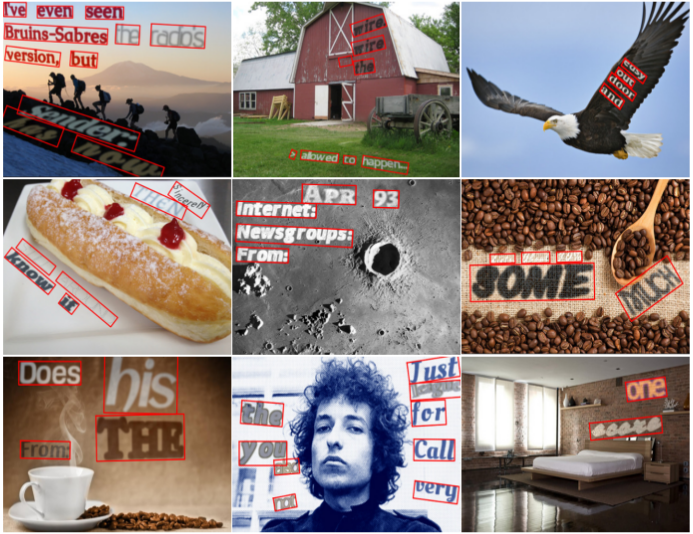SynthText
Code for generating synthetic text images as described in "Synthetic Data for Text Localisation in Natural Images", Ankush Gupta, Andrea Vedaldi, Andrew Zisserman, CVPR 2016.
Synthetic Scene-Text Image Samples

The library is written in Python. The main dependencies are:
pygame, opencv (cv2), PIL (Image), numpy, matplotlib, h5py, scipy
Generating samples
python gen.py --viz
This will download a data file (~56M) to the data directory. This data file includes:
- dset.h5: This is a sample h5 file which contains a set of 5 images along with their depth and segmentation information. Note, this is just given as an example; you are encouraged to add more images (along with their depth and segmentation information) to this database for your own use.
- data/fonts: three sample fonts (add more fonts to this folder and then update
fonts/fontlist.txtwith their paths). - data/newsgroup: Text-source (from the News Group dataset). This can be subsituted with any text file. Look inside
text_utils.pyto see how the text inside this file is used by the renderer. - data/models/colors_new.cp: Color-model (foreground/background text color model), learnt from the IIIT-5K word dataset.
- data/models: Other cPickle files (char_freq.cp: frequency of each character in the text dataset; font_px2pt.cp: conversion from pt to px for various fonts: If you add a new font, make sure that the corresponding model is present in this file, if not you can add it by adapting
invert_font_size.py).
This script will generate random scene-text image samples and store them in an h5 file in results/SynthText.h5. If the --viz option is specified, the generated output will be visualized as the script is being run; omit the --viz option to turn-off the visualizations. If you want to visualize the results stored in results/SynthText.h5 later, run:
python visualize_results.py
Pre-generated Dataset
A dataset with approximately 800000 synthetic scene-text images generated with this code can be found here.
Adding New Images
Segmentation and depth-maps are required to use new images as background. Sample scripts for obtaining these are available here.
predict_depth.mMATLAB script to regress a depth mask for a given RGB image; uses the network of Liu etal. However, more recent works (e.g., this) might give better results.run_ucm.mandfloodFill.pyfor getting segmentation masks using gPb-UCM.
For an explanation of the fields in dset.h5 (e.g.: seg,area,label), please check this comment.
Pre-processed Background Images
The 8,000 background images used in the paper, along with their segmentation and depth masks, have been uploaded here:
http://zeus.robots.ox.ac.uk/textspot/static/db/<filename>, where, <filename> can be:
imnames.cp[180K]: names of filtered files, i.e., those files which do not contain textbg_img.tar.gz[8.9G]: compressed image files (more than 8000, so only use the filtered ones in imnames.cp)depth.h5[15G]: depth mapsseg.h5[6.9G]: segmentation maps
Note: I do not own the copyright to these images.
Vietnamese
- Adding vietnamese
- add arial and time new roman fonts
- add character statistic
- add corpus contains 73913 words
Further Information
Please refer to the paper for more information, or contact me (email address in the paper).